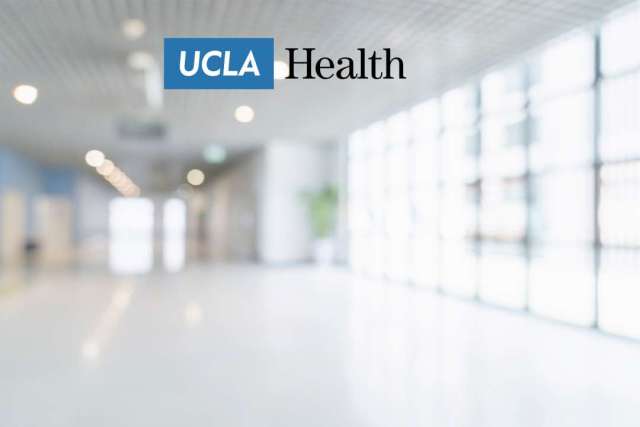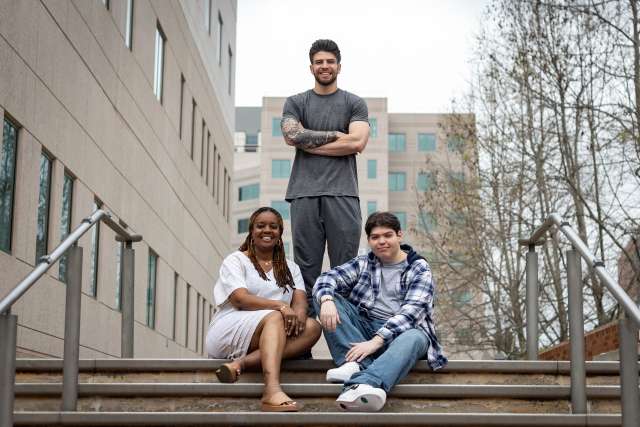(Note to editors: A patient family is available for interviews.)
| Anya, 2, who underwent non-invasive testing and surgery at UCLA, is now seizure-free. |
Now, a study by researchers with UCLA's Pediatric Epilepsy Surgery Program has found that an alternative, non-invasive approach to pre-surgical testing, along with earlier consideration for surgery, is associated with the best seizure-free surgical outcome in patients with TSC.
"Surgery to remove the portion of the brain causing the epilepsy is the most successful treatment for children with TSC and intractable epilepsy, but mapping which parts to take out can be challenging in a disease with multiple tubers in the brain and therefore multiple potential seizure-generating regions," said lead study author Dr. Joyce Wu, an associate professor of pediatric neurology at Mattel Children's Hospital at UCLA.
"The standard test of implanting electrodes into the patient's head is uncomfortable, leads to a prolonged hospital stay with increased costs, and potentially increases the risks from surgery," she said. "Our study looked at the effectiveness of our non-invasive, diagnostic imaging approach, which appeared to work just as well."
The study is the first to examine UCLA's non-invasive approach, which uses a combination of magnetic resonance imaging (MRI), fluoro-deoxyglucose positron emission tomography (FDG-PET) and magnetic source imaging (MSI) to identify the area of brain to be removed. The results showed that approximately two-thirds of TSC patients became seizure-free after surgery. The non-invasive results were similar to the traditional surgical testing method of implanting electrodes into the patient's head for several days of monitoring.
Researchers also unexpectedly found that shorter seizure duration before surgery was associated with the best chance of children with TSC becoming seizure-free following surgery. Therefore, they said, it is important to consider surgery early, when medications fail to control seizures.
The study findings appear in the Feb. 2 issue of Neurology, the medical journal of the American Academy of Neurology.
Up to 90 percent of patients with TSC have epilepsy, with a significant portion suffering from medication-resistant, or intractable, epilepsy. For these patients, surgical removal of the tuber and surrounding cerebral cortex may offer seizure freedom.
The study included 28 TSC patients with intractable epilepsy referred to UCLA between 2000 and 2007. In addition to the standard pre-surgical evaluation, these patients had MSI and FDG-PET/MRI co-registration. None had the invasive intracranial test. Of these patients, 18 (64 percent) underwent surgical resection, and of those, 12 (67 percent) were seizure-free postoperatively with an average follow up of 4.1 years.
The study also confirmed that a younger age at surgery and shorter seizure duration were associated with post-operative freedom of seizures. Since epilepsy in children can be severely debilitating, early diagnosis and treatment are critical in helping a child reach full cognitive potential.
Anya, now two-and-a-half years old, underwent the surgery at UCLA when she was 16 months old. After suffering up to 30 seizures a day and her medications not working as effectively, Dr. Wu and her team suggested that Anya be evaluated for surgery to remove the offending tubers.
She then underwent the non-invasive testing and was found to be a good candidate for surgery. It has been more than a year since her seven-hour operation, and she is still seizure-free.
"TSC is a pretty devastating disease," said Anya's mother, Anita Smith, who wrote an article about her daughter's condition for a parenting website. "It's important for parents to know that they do not have to put their child through so many invasive tests and that surgery can be more successful if it's done earlier."
The next stage of research will focus on applying this approach to non-TSC patients, encouraging earlier considerations for surgery, reporting seizure outcomes after longer postoperative follow-ups, and assessing long-term developmental outcomes.
"UCLA is one of the few centers with the ability and experience to treat kids with this rare disorder," said senior author Dr. Gary Mathern, professor of neurosurgery at UCLA. "By developing improved technologies to help these young patients, we hope to make a difference in their lives."
Additional authors included Dr. Noriko Salamon, Dr. Raman Sankar and Dr. W. Donald Shields, of UCLA; Dr. Heidi E. Kirsch, Mary M. Mantle and Dr. Srinivasan S. Nagarajan, of UC San Francisco; and Lacey Kurelowech and Dr. Maung H. Aung, of the Scripps Clinic.
This study was supported by the National Institue of Neurological Disorders and Stroke of the National Institutes of Health. The authors have no financial ties to disclose.
UCLA Mattel Children's Hospital, one of the highest-rated children’s hospitals in California, is a vital component of UCLA Medical Center, ranked by U.S. News & World Report as the third best hospital in nation and best in the Western United States. Mattel Children’s Hospital offers a full spectrum of primary and specialized medical care for infants, children and adolescents. The hospital’s mission is to provide state?of-the-art treatment for children in a compassionate atmosphere, as well as to improve the understanding and treatment of pediatric diseases.



